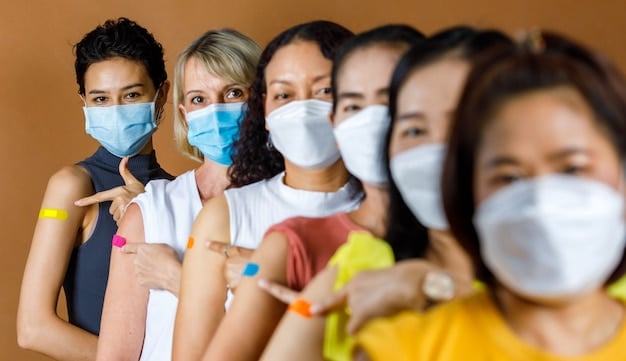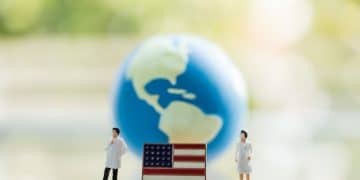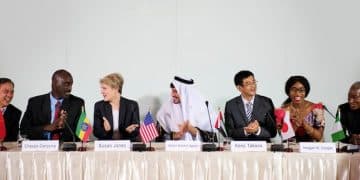US & WHO in 2025: Navigating Global Health Crises Ahead

Advertisements
The relationship between the United States and the World Health Organization (WHO) is poised for critical evolution in 2025, as both entities navigate complex global health crises, requiring enhanced strategic cooperation, funding stability, and redefined leadership in pandemic preparedness, equitable vaccine distribution, and robust health system strengthening worldwide.
As the world continues to grapple with the aftermath of recent global health crises, the imperative for robust international collaboration has never been clearer. In 2025, the dynamic between The US and the World Health Organization: Navigating Global Health Crises in 2025 will undoubtedly shape the future of global public health.
The evolving US-WHO relationship in 2025
The relationship between the United States and the World Health Organization has historically been characterized by both strong partnership and periods of tension. As the global landscape shifts, 2025 presents a crucial juncture for redefining this alliance.
The US, as the largest financial contributor to the WHO, holds significant influence, yet this influence has often been tempered by political shifts and differing national interests. The lessons learned from recent pandemics underscore the critical need for continuous engagement, even amidst divergences in approach.
Historical context and recent challenges
Understanding the current trajectory requires a brief look back. The past few years have seen significant fluctuations in US engagement with the WHO, ranging from threats of withdrawal to renewed commitments. These shifts highlight the delicate balance between national sovereignty and collective global health security.
- Funding Discrepancies: The debate around assessed contributions versus voluntary contributions remains a point of contention, impacting the WHO’s financial stability.
- Policy Divergences: Disagreements on origin investigations, travel restrictions, and vaccine equity have tested the relationship.
- Leadership Roles: The discussion about who leads global health initiatives—the WHO, individual nations, or a broader coalition—continues to evolve.
Moving into 2025, both parties recognize the mutual benefits of a stable and predictable partnership. The world cannot afford fragmented responses to health threats that inherently transcend borders.
This evolving dynamic demands not just financial contributions but also robust policy dialogue, shared scientific endeavor, and a mutual commitment to global health equity. The ability for the US and WHO to effectively navigate these waters will determine the resilience of future health systems.
Strengthening global pandemic preparedness
One of the most pressing challenges facing the world in 2025 is the urgent need to bolster global pandemic preparedness. The experiences of recent outbreaks have laid bare existing vulnerabilities in early warning systems, rapid response mechanisms, and equitable access to medical countermeasures.
The WHO serves as the central coordinating body for global health emergencies, but its effectiveness is highly dependent on the cooperation and resources provided by member states, particularly major global powers like the US.
Early warning systems and surveillance
Effective pandemic preparedness hinges on robust and transparent early warning systems. This involves not only identifying novel pathogens but also sharing information swiftly and accurately across international borders. The US has significant technical expertise in surveillance that can further enhance the WHO’s capabilities.
- Integrated Data Platforms: Developing unified data platforms that allow for real-time sharing of epidemiological intelligence is crucial.
- Capacity Building: Investing in laboratory infrastructure and trained personnel in low-income countries strengthens the global network.
- Trust and Transparency: Fostering an environment where countries feel secure sharing sensitive health data without fear of punitive measures is paramount.
Moreover, the establishment of a robust global pathogen surveillance network, potentially under the WHO’s purview but with strong financial and technical backing from countries like the US, is a recognized priority. This network would allow for faster detection and characterization of new threats, enabling quicker deployment of countermeasures.
The collaborative development of international health regulations (IHR) that are both effective and universally adhered to will be a cornerstone of this enhanced preparedness. The US has a role in advocating for and complying with these regulations, setting a precedent for other nations.
Ensuring equitable access to vaccines and treatments
The stark inequities in vaccine and treatment distribution observed during recent pandemics highlighted a critical flaw in global health governance. As we look towards 2025, ensuring equitable access is not merely an ethical imperative but a strategic necessity for containing future outbreaks effectively.

The US, with its significant pharmaceutical research and development capabilities, holds a key position in addressing this challenge. Its willingness to support initiatives that prioritize global access over national hoarding will be a defining factor in 2025.
Mechanisms for fair distribution
Several mechanisms have been proposed or are already in place to facilitate equitable access, but their effectiveness often depends on sustained political will and financial commitment.
- COVAX Facility Reinforcement: Strengthening and adequately funding initiatives like COVAX to ensure a predictable supply of vaccines to lower-income countries.
- Technology Transfer and Local Production: Supporting the transfer of vaccine manufacturing technology and intellectual property to developing nations to build regional production hubs.
- Procurement Transparency: Advocating for greater transparency in vaccine procurement and pricing to prevent price gouging and ensure affordability.
Beyond vaccines, ensuring equitable access to essential medicines, diagnostics, and protective equipment is equally vital. Many low-income countries continue to face challenges in securing these fundamental tools, exacerbating health disparities during crises.
The US engagement with the WHO in 2025 will involve active participation in formulating new global agreements or amendments to existing ones that embed equity as a core principle for pandemic response. This includes leveraging diplomatic channels to encourage other wealthy nations to follow suit, fostering a truly global approach to health security.
Financial commitments and sustainable funding models
The financial stability of the World Health Organization is a perpetual concern. Its ability to respond effectively to global health crises is directly tied to the predictability and adequacy of its funding. As 2025 approaches, discussions around sustainable funding models are more critical than ever.
The US, historically the largest voluntary contributor, has a vested interest in a well-resourced WHO. However, relying heavily on voluntary contributions can introduce unpredictability and earmarking, limiting the WHO’s flexibility in addressing emerging priorities.
Reforming WHO financing
There is a growing consensus among international health experts and member states that the WHO’s financing structure requires significant reform. A shift towards a greater proportion of assessed contributions, based on a country’s economic strength, is often cited as a more sustainable path.
Such a shift would provide the WHO with a more stable and predictable budget, allowing it to plan long-term strategies and respond swiftly to unforeseen emergencies without being constrained by unpredictable donor funding cycles.

- Increased Assessed Contributions: Advocating for and committing to a higher percentage of funding through assessed contributions.
- Emergency Preparedness Funds: Establishing dedicated, pre-negotiated emergency funds that can be rapidly deployed during crises.
- Private Sector Engagement: Exploring ethical and transparent ways to leverage private sector investment in global health initiatives, while maintaining WHO independence.
The US role in 2025 will involve not only maintaining its financial commitments but also leading discussions on fundamental reforms to WHO financing. This will require political leadership to convince other major economies to increase their assessed contributions, ensuring a collective burden-sharing approach.
Ultimately, a sustainably funded WHO is a global public good. It underpins effective surveillance, rapid response, research coordination, and the provision of technical guidance that benefits all nations, including the United States.
The role of the US in global health governance
Beyond its financial contributions, the United States plays a multifaceted role in global health governance, influencing norms, policies, and strategic directions within and outside the WHO framework. In 2025, this leadership will be crucial in shaping the future of international health cooperation.
The US has a unique ability to convene stakeholders, drive research agendas, and champion specific health initiatives. However, effective leadership also requires listening and adapting to the needs and perspectives of diverse nations.
Collaborative diplomacy and soft power
US influence extends through its diplomatic efforts, scientific institutions, and philanthropic organizations. Utilized effectively, this soft power can foster a more cohesive and resilient global health architecture.
- Bilateral and Multilateral Partnerships: Strengthening health partnerships with individual countries and engaging proactively in multilateral forums beyond the WHO.
- Research and Innovation Leadership: Continuing to invest in cutting-edge health research and sharing scientific advancements for global benefit.
- Advocacy for Health Security: Championing the concept of health security as integral to national security and economic stability on the international stage.
Furthermore, the US engagement with the WHO in 2025 must also involve actively supporting the WHO’s normative function—its role in setting global health standards, developing guidelines, and providing technical assistance. This includes acknowledging the WHO’s expertise and autonomy in these areas.
Responsible global leadership also entails a commitment to multilateralism, recognizing that complex global health challenges cannot be effectively addressed through unilateral action. The US can set an example by reinforcing international regulations and contributing to a more equitable global health order.
Addressing non-communicable diseases and long-term health challenges
While acute global health crises like pandemics often dominate headlines, the ongoing burden of non-communicable diseases (NCDs) and other chronic health challenges remains a colossal threat to global well-being. In 2025, the US and WHO must deepen their collaboration on these issues, transitioning from reactive crisis management to proactive health promotion.
NCDs such as cardiovascular diseases, diabetes, cancers, and chronic respiratory diseases exact a devastating toll, particularly in low and middle-income countries. These conditions often complicate outcomes during infectious disease outbreaks and place immense strain on healthcare systems.
Integrated approaches to health
A holistic approach that integrates responses to NCDs with infectious disease control and health system strengthening is essential. The WHO has been at the forefront of advocacy for NCD prevention and control, but greater investment and political will are needed from member states.
- Prevention Strategies: Promoting healthier lifestyles, accessible nutrition, and advocating for policies that reduce risk factors like tobacco and excessive sugar consumption.
- Early Detection and Management: Improving access to screening, diagnosis, and affordable long-term care for NCDs.
- Mental Health Integration: Elevating mental health as a core component of overall health, recognizing its profound impact on individuals and societies.
The US can contribute significantly through its research institutions, sharing best practices in public health interventions, and supporting global initiatives aimed at reducing the burden of NCDs. This support is not just about financial aid but also about technical assistance and policy advocacy.
Collaborating on NCDs in 2025 means acknowledging that health is interconnected. A population weakened by chronic illness is inherently more vulnerable to new diseases. Therefore, investing in the long-term health of global populations is an integral part of preparing for future health crises.
It will also involve working through WHO frameworks to address the social and environmental determinants of health, recognizing that factors such as clean water, sanitation, and climate change significantly impact the global health landscape. The US and WHO need to work hand-in-hand to ensure that these foundational aspects of public health are addressed effectively. Building resilient health systems requires a multifaceted approach that considers both immediate threats and long-standing challenges, emphasizing a collaborative strategy for sustainable global health.
| Key Area | Focus in 2025 |
|---|---|
| 🤝 Relationship Evolution | Redefining engagement, stable partnerships. |
| 🚨 Pandemic Preparedness | Boosting early warning, rapid response. |
| 💉 Equitable Access | Fair vaccine & treatment distribution. |
| 💰 Sustainable Funding | Reforming WHO’s financial structure. |
Frequently asked questions about US-WHO cooperation
The US is a major global player both economically and scientifically. Its engagement, financial contributions, and scientific expertise are critical for the WHO’s ability to coordinate global health efforts, especially during pandemics. A strong partnership ensures more effective responses to health crises that transcend national borders, benefiting all countries.
Key challenges include stabilizing WHO funding, defining clear roles in global health governance, addressing policy divergences on issues like travel restrictions and data sharing, and ensuring equitable distribution of health resources. Overcoming political tensions and fostering trust are also paramount for effective future cooperation.
The US can contribute by sharing its advanced surveillance technologies, investing in global laboratory networks, providing technical assistance for capacity building in developing countries, and advocating for robust international health regulations. Its leadership can also encourage transparency and rapid information sharing during outbreaks, enhancing collective readiness.
The focus on equitable vaccine access is expected to intensify by 2025. Efforts will likely concentrate on strengthening global procurement mechanisms like COVAX, facilitating technology transfer for local manufacturing, and negotiating fairer pricing for essential medical products. The US’s role in driving these initiatives will be significant.
The WHO often relies heavily on voluntary contributions, which can be unpredictable and earmarked, limiting its flexibility. A shift towards a greater proportion of stable assessed contributions, as advocated by many, would provide a more reliable budget, allowing the organization to plan and respond more effectively to both ongoing and emerging global health challenges.
Conclusion: Charting a collaborative course for global health
The year 2025 represents a pivotal moment for the relationship between the United States and the World Health Organization. The lessons painfully learned from past crises underscore the undeniable reality that global health security is a shared responsibility, demanding sustained strategic engagement and mutual trust. While complexities and points of divergence will undoubtedly persist, the imperative for a cohesive, well-funded, and adaptable WHO remains paramount. The US, with its unparalleled resources and influence, has a profound opportunity and responsibility to champion multilateralism, ensuring that the world is better prepared, more equitable, and fundamentally healthier in the face of future challenges. The path forward is one of reinforced partnerships, transparent dialogue, and an unwavering commitment to the collective well-being of all nations.





